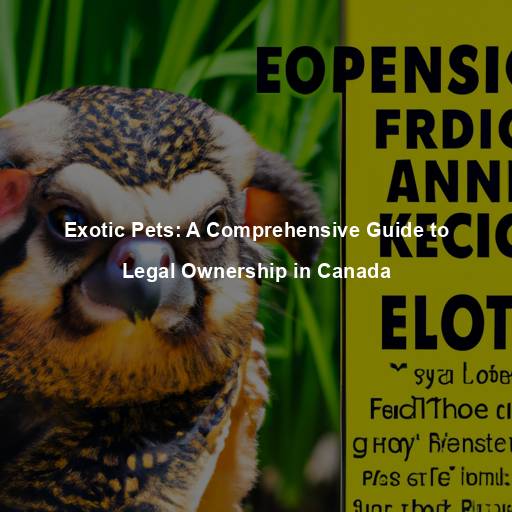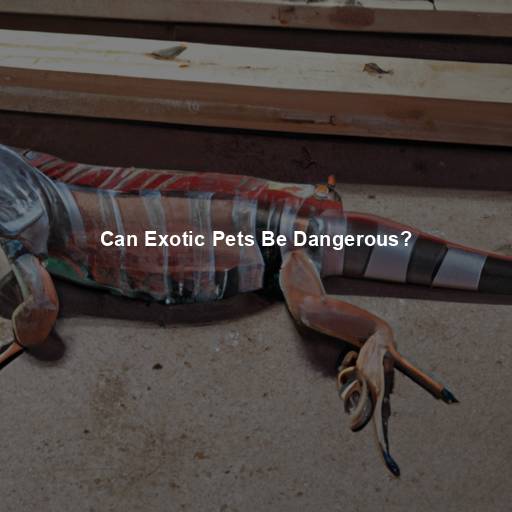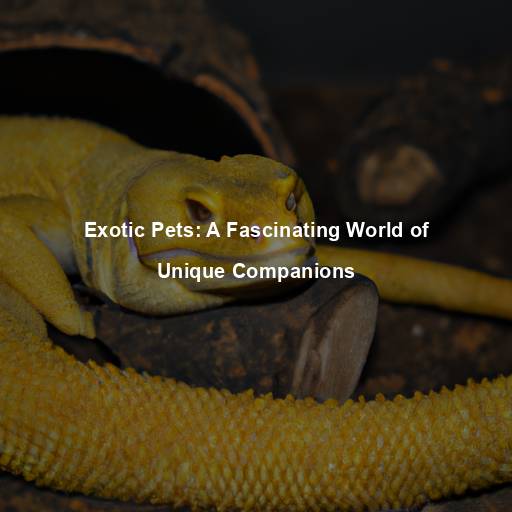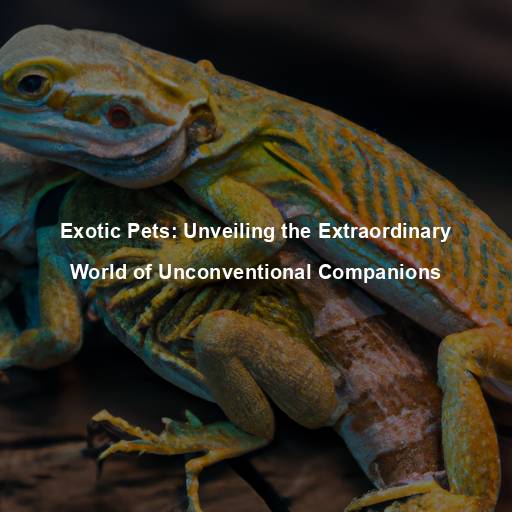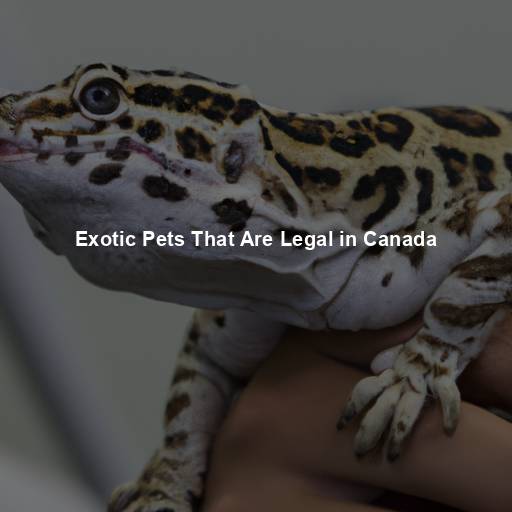Exotic Pets: A Comprehensive Guide to Legal Ownership in Canada
Last Updated on July 28, 2023 by Evan
Contents [hide]
- 1 An to Exotic Pets
- 2 The Legal Landscape of Exotic Pet Ownership in Canada
- 3 Legal Exotic Pets in Canada
- 4 Ethical Considerations and Responsible Ownership
- 5 Understanding the Risks and Challenges of Exotic Pet Ownership
- 6 The Exotic Pet Community: Resources and Support
- 7 FAQs – What Exotic Pets are Legal in Canada?
- 7.1 Q: What is considered an exotic pet in Canada?
- 7.2 Q: Are all exotic pets legal to own in Canada?
- 7.3 Q: Can I own a monkey as a pet in Canada?
- 7.4 Q: Can I have a pet snake or reptile in Canada?
- 7.5 Q: What about owning a pet bird that is not native to Canada?
- 7.6 Q: Can I legally keep a pet fox or raccoon in Canada?
- 7.7 Q: Are there any licensing requirements for owning exotic pets in Canada?
- 7.8 Q: What should I do if I want to own an exotic pet in Canada?
An to Exotic Pets
There’s something undeniably captivating about the world of exotic pets – their exotic beauty, their fascinating behaviors – it’s enough to spark anyone’s imagination. From vibrant reptiles to majestic birds, these extraordinary creatures have a way of stealing our hearts. But, before you embark on the journey of owning an exotic pet, it’s important to navigate the intricate web of legal restrictions, ethical concerns, and the responsibility it entails. In this comprehensive guide, we’ll take a deep dive into the realm of exotic pets in Canada and shed some light on the perplexing world of their ownership.
Understanding the Term “Exotic Pets”
Delve into the enigmatic realm of exotic pets as we unravel the intricacies that lie within the confines of legality and companionship. These captivating creatures, diverse in their non-native origins, grace our lives with their presence, deviating from the conventional realm of agricultural or commercial purposes. From slithering reptiles to melodious birds, from amphibians that defy logic to the elusive species of fish, these enigmatic beings find themselves entwined in the human sphere. As they weave their way into our hearts, let us explore the various avenues through which we welcome them – be it through domestication, captivity, or the rescued realms curated by noble organizations and reputable breeders.
The Legal Landscape of Exotic Pet Ownership in Canada
Federal Legislation: The Wild Animal and Plant Protection and Regulation of International and Interprovincial Trade Act (WAPPRIITA)
Navigating the intricate world of wildlife regulation in Canada can be a perplexing endeavor for animal enthusiasts. Enter the WAPPRIITA, a profound federal legislation shrouded in intricacy, designed to safeguard our at-risk species and fend off unwanted invasions by nefarious intruders. This enigmatic act presides over the import, export, and interprovincial trade of wildlife, placing certain exotic creatures in the precarious grip of permits and authorizations, ensuring that only the most knowledgeable and responsible caregivers may embark on the extraordinary journey of pet ownership. Aspiring exotic pet aficionados must delve into the labyrinthine depths of WAPPRIITA’s requirements to gain a profound understanding of the complex tapestry woven to protect our delicate ecosystems.
Provincial and Territorial Regulations
When it comes to owning exotic pets in Canada, navigating the legal landscape can be a perplexing endeavor. Not only do federal laws cast their long shadow, but each province and territory boasts its own intricate web of regulations. Bafflingly, these regulations are far from uniform, ranging from stringent limitations to surprisingly permissive policies. To avoid finding oneself in the jaws of legal trouble, it is imperative for prospective exotic pet owners to delve deep into the labyrinthian intricacies of their specific province or territory’s regulations, ensuring strict adherence to the law.
Wildlife Rehabilitation and Conservation Centers
In cases where individuals encounter exotic animals in need of care or rehabilitation, it is important to reach out to licensed wildlife rehabilitation and conservation centers. These organizations have the expertise and resources to provide appropriate care for injured or abandoned animals. Surrendering exotic pets to these centers ensures their well-being and contributes to the conservation efforts of endangered species.
Legal Exotic Pets in Canada
Reptiles and Amphibians
In Canada, the ownership of reptiles and amphibians as exotic pets is subject to specific regulations. Some reptiles commonly kept as pets, such as geckos, bearded dragons, and corn snakes, are legal to own without permits. However, certain species, including venomous snakes and large constrictor snakes, may require permits or authorizations due to safety concerns. It is crucial to research and understand the specific requirements for each species before considering them as pets.
Birds
Have you ever been captivated by the vibrant colors and enchanting tunes of exotic birds? It’s no secret that these feathered companions have a special place in our hearts. Interestingly, in Canada, the rules regarding bird ownership can be a bit of a perplexing puzzle. While most bird species don’t require permits, there is a caveat: some birds are listed under the Convention on International Trade in Endangered Species of Wild Fauna and Flora (CITES).
Small Mammals
When it comes to the wonderfully diverse world of animal companionship, Canada opens its arms to some truly extraordinary options. From the enchanting hedgehogs to the adorable sugar gliders and a variety of rodents, these small mammals have captivated the hearts of many. However, before diving headfirst into this unique venture, it is of paramount importance to delve into the intricate details of their individual care needs. Building a suitable environment, ensuring proper nutrition, and seeking expert veterinary care are all crucial components in nurturing the physical and emotional well-being of these charming furry friends.
Fish and Aquatic Species
While most fish and aquatic species are not subject to specific regulations, there are exceptions. Some exotic fish species, such as piranhas or certain types of venomous or invasive species, may require permits or authorizations. It is important to research the specific regulations related to fish and aquatic species in your province or territory to ensure compliance.
Ethical Considerations and Responsible Ownership
The Importance of Research and Education
Intrigued by the allure of owning a unique and exotic pet? Prepare yourself for a whirlwind of research and discovery! Embark on an exciting journey to unravel the mysteries and peculiarities of your desired species. Delve into the depths of their natural habitat, unlock the secrets of their dietary preferences, decipher the enigmatic codes of their social behaviors, and unveil the hidden challenges of their health concerns.
Responsible Pet Ownership
Owning an exotic pet can unleash a world of adventure and intrigue, but it’s not for the faint of heart. The allure of these extraordinary companions comes with a price, demanding your undivided attention, resources, and a unique understanding of their needs. Before embarking on this enigmatic journey, take a moment to reflect on your own capacity – both emotionally and financially – to nurture and protect these extraordinary creatures. Their lifespan, the availability of specialized veterinary care, and the captivating challenges that lie ahead must be carefully pondered.
Conservation and Protection of Wildlife
One of the primary concerns surrounding exotic pet ownership is the impact it can have on wildlife populations and ecosystems. It is crucial to support conservation efforts by avoiding the purchase of wild-caught animals and focusing on captive-bred species from reputable breeders. By doing so, you contribute to the preservation of endangered species and discourage the illegal wildlife trade.
Valuing Rehabilitation and Rehoming
The allure that lures us into the enigmatic world of exotic pets can often cloud our judgment, but it is, without a doubt, vital to pause a moment and ponder upon the alternative – adoption and the support of rescue organizations. This avenue grants us the chance to bestow a sanctuary of love upon creatures that have faced abandonment, surrender, or the consequences of inadequate care. Countless organizations stand firm in their dedication to salvaging and restoring the lives of these extraordinary beings, ensuring they receive the tender care and unwavering attention they rightly deserve. Embracing the noble act of adoption from such organizations not only displays our kinship but also substantiates our commitment towards fostering evolution and granting second chances to those who yearn for them most.
The Benefits of Adoption
There’s a certain allure in sharing your home with an exotic pet, but why not take it a step further and make a real difference in the life of a rescued animal? By adopting from a reputable rescue organization, you’re not only opening your heart and home to a furry friend that may have known nothing but neglect and mistreatment, but you’re also supporting an invaluable cause. These organizations don’t just hand over the leash and say good luck – they’re there every step of the way, offering guidance and support to ensure a smooth transition for all parties involved. Plus, by paying those adoption fees, you’re directly contributing to the ongoing rescue and rehabilitation efforts that make these heartwarming stories possible.
Responsible Ownership and Adoption
Contemplating the journey of adoption necessitates a profound appraisal of one’s own preparedness and aptitude to cater to the unique necessities that each species demands. From the innate disposition and physique of the animal to the intricate intricacies of their care regimens, every facet deserves careful consideration. Let us not forget the invaluable wisdom that rescue organizations offer, revealing the idiosyncratic requirements of the creatures under their watchful embrace and affording the wisdom needed to navigate this discerning decision. For, remember, the mantle of responsible ownership transcends the mere moment of adoption, entailing a profound, lasting commitment to the enduring welfare of your newfound, extraordinary companion.
Understanding the Risks and Challenges of Exotic Pet Ownership
Zoonotic Diseases and Health Considerations
One of the primary concerns associated with exotic pet ownership is the risk of zoonotic diseases. Zoonoses are infectious diseases that can be transmitted between animals and humans. Some exotic pets, such as reptiles and birds, have the potential to carry bacteria, parasites, or viruses that can pose health risks to their owners. It is crucial to practice good hygiene, proper handling techniques, and regular veterinary care to minimize the risk of zoonotic diseases and ensure the well-being of both pet and owner.
Potential Environmental Impact
The sudden liberation of exotic pets into unfamiliar environments creates a whirlwind of perplexity for local ecosystems. These unwelcome occupants can play havoc with natural habitats, engaging in fierce resource wars with indigenous species, and even fanning the flames of disease. To safeguard the delicate balance of our surroundings, it is of utmost importance to resist the urge to release any exotic pet into the wild. Rather, let us bestow the responsibility upon suitable establishments or authorities, who possess the expertise to provide the necessary care and support for these creatures.
Financial Considerations
Exotic pets often require specialized care, which can be financially demanding. Costs associated with enclosures, heating, lighting, specialized diets, and veterinary care can quickly add up. Before committing to exotic pet ownership, it is crucial to assess your financial capabilities and ensure you can provide the necessary resources for the animal’s well-being throughout its lifespan.
Legal Compliance and Consequences
Failure to comply with the legal regulations surrounding exotic pet ownership can have serious consequences. Violating federal, provincial, or territorial laws can result in fines, confiscation of the animal, or legal repercussions. It is essential to educate yourself about the specific regulations in your area and ensure you are in full compliance to avoid any legal complications.
The Exotic Pet Community: Resources and Support
Connecting with Other Exotic Pet Owners
Being part of a community of like-minded exotic pet owners can be invaluable. Online forums, social media groups, and local clubs provide an opportunity to connect with experienced individuals who can offer advice, share knowledge, and provide support. Engaging with the exotic pet community can help you stay updated on the latest research, advancements in care techniques, and potential challenges you may encounter as an owner.
Seeking Professional Guidance
Ensuring the optimal health and happiness of our furry friends is a priority that cannot be overlooked. When it comes to exotic pets, the path to comprehensive care can be a bit perplexing. Thankfully, the invaluable assistance of skilled veterinarians who specialize in these unique creatures can provide a sense of relief. By seeking their guidance, tailored advice, thorough health evaluations, and essential treatments can be offered, guaranteeing our beloved companions receive the care they deserve.
Educational Resources and Organizations
The world of exotic pets is as diverse and captivating as it is perplexing. Amidst the bewildering array of choices, there exists a realm of dedicated organizations and educational resources that unravel the enigmatic world of responsible ownership. Within their carefully crafted guides, care sheets, and educational materials, a treasure trove of knowledge awaits, equipping individuals with the wisdom to make informed decisions and provide optimal care for their unique companions. Embracing these invaluable resources unravels the mystique of exotic animals, enhancing our understanding and paving the path towards responsible ownership.
FAQs – What Exotic Pets are Legal in Canada?
Q: What is considered an exotic pet in Canada?
Discover the wild wonders of exotic pets in Canada, where the unconventional reigns supreme. From rare and unusual creatures sourced from distant lands to captivating companions with peculiar traits, these non-traditional animals challenge the notion of a conventional household pet. Explore the fascinating world beyond dogs and cats, as we unravel the enigmatic allure of these captivating companions rarely seen in everyday life.
Q: Are all exotic pets legal to own in Canada?
A: No, not all exotic pets are legal to own in Canada. The legality of owning an exotic animal varies depending on the specific province or territory. Some animals may be prohibited completely, while others may require specific permits or licenses to possess.
Q: Can I own a monkey as a pet in Canada?
In Canada, the ownership of monkeys as pets is widely frowned upon and generally prohibited. These fascinating creatures, including monkeys and great apes, demand an intricate network of social connections and specialized environments that are simply impractical for private individuals to provide. Nevertheless, certain exemptions might be granted to accredited zoos or distinguished research institutions, recognizing their expertise in caring for these extraordinary beings.
Q: Can I have a pet snake or reptile in Canada?
While many Canadians may be intrigued by the idea of owning a pet snake or reptile, the legality surrounding this unique endeavor can be a convoluted labyrinth of federal, provincial, and municipal regulations. With an array of potential restrictions, from specific species limitations to confounding maximum size constraints, aspiring reptile enthusiasts must navigate this perplexing landscape with caution. Diligently researching and comprehending the intricate regulations in their specific area is indispensable before embarking on this scaly venture.
Q: What about owning a pet bird that is not native to Canada?
Have you ever wondered about the allure of having an exotic bird as a pet? Well, in Canada, fulfilling that dream is not entirely out of reach. While there are certain guidelines and legalities to consider, such as ensuring the birds are legally imported and not endangered or protected, with a little research and the right permits, you could find yourself with a fascinating feathered companion. Don’t forget to consult with the Canadian Wildlife Service to navigate through the perplexities of acquiring and caring for an exotic avian species.
Q: Can I legally keep a pet fox or raccoon in Canada?
Keeping foxes and raccoons as pets in Canada is a legal labyrinth. These captivating creatures, deemed wildlife, are entangled in a web of strict regulations. With their inherent need for specialized care and natural habitats, the prospect of owning them perplexes most, leaving their true wild spirit to roam free.
Q: Are there any licensing requirements for owning exotic pets in Canada?
A: Yes, some exotic pets may require licenses or permits to own legally in Canada. The specific requirements vary by province or territory, as well as the type of animal being kept. It is vital to consult with local authorities, such as the Canadian Food Inspection Agency or provincial wildlife agencies, to ensure compliance with licensing regulations.
Q: What should I do if I want to own an exotic pet in Canada?
A: If you are considering owning an exotic pet in Canada, it is crucial to thoroughly research the laws and regulations specific to your province or territory. Contact local authorities, reputable breeders, or exotic pet organizations for accurate information. Additionally, ensure you have the knowledge, resources, and commitment required to properly care for the animal’s unique needs before bringing it into your home.

